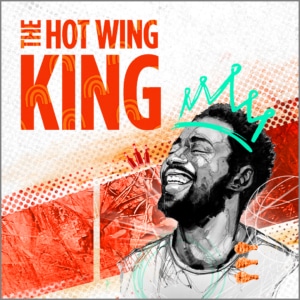DCPA NEWS CENTER
Enjoy the best stories and perspectives from the theatre world today.
Enjoy the best stories and perspectives from the theatre world today.

Royalty comes in many forms. A proud and gleaming crown. A leader, whether head of the household, a proud parent, or the coach of a team. Or even the playful banter between lovers, endearments of “Queen!” that make another person feel warm and shining from the inside out, worthy of love and devotion. This potent mix of splendor and joy makes The Hot Wing King’s portrayal of Black friends and family so irresistible.
Welcome to Memphis, Tennessee, where contestants are spicing their chicken wings, testing their marinades, and prepping for the annual Hot Wang Festival. The culinary team New Wing Order has been trying for five years to win the top prize, and head chef Cordell is determined that this will be the year they come home as the victors. And while perfecting recipes and flavors may be at the top of his mind, bubbling around him are the rest of his crew: good friends Big Charles and Isom, and his lover Dwayne, whose house he recently moved into. It’s a home that buzzes with activity, jokes, and warmth, a place where these men treat each other with vulnerability, tenderness, and wit.
“Many of the characters reflect my identity as a gay Black man,” says director Timothy Douglas, reflecting on what he is looking forward to most in helming this comedy-drama and winner of the 2021 Pulitzer Prize. “The world is so immediate for me in terms of the characters, the specific joys, challenges, and underlying elements specifically in Black culture, and in being queer and Black that we don’t necessarily talk about because we vibe together in community.”
Indeed, Memphis-born playwright Katori Hall has given the audience an invitation into this kitchen and community, using cooking and competition as the rituals that bring people together. The bodacious men dance, flirt, and posture as easily as jesters in a court or princes at a ball as they playfully prep their ingredients. Bone-in wings. Garlic. Parmesan, parsley, peli-peli pepper. Even blueberries (to go with blue cheese as the aptly named “Blueberry Birds” special). All of this spice, flavor, and heat are symbolic of deeper Black history and culture.
“The way Katori is dealing with spice, creation, and creativeness within food making is an homage, and honoring what we as a people know in daily life and our bones,” remarks Douglas. “During times of slavery, we were only given the scraps, the parts of the animal that the privileged didn’t deem suitable for eating. Those scraps and discards became the main part of the meal, and how it became palatable was how it was spiced. It’s a representation of care — the augmenting, creating, and inventing of how you spice — it’s in the bones of the play and something these characters know well.”
And over the course of the play, these characters come to know each other more intimately as blood and chosen family, encountering each other in complementary and clashing ways. Amid the taste testing and marination, the New Wing Order’s weekend is interrupted when Everett and TJ, Dwayne’s 16-year-old nephew and brother-in-law, show up at the house. Although skeptical of Cordell and Dwayne’s lifestyle, and dealing with his own pressures around fatherhood, TJ leaves his son with them to take care of business. During a basketball game, Everett and Cordell have a confrontation that draws Dwayne into the fray and reveals a deep social injustice and past family grief.
It’s a moment that makes Dwayne and Cordell face each other’s secrets and desires — how Cordell is not ready to reveal their relationship to his former family, and how Dwayne grapples with his role as a brother, uncle, and father figure. It’s a choice of how to accept and love each other in full dignity — a choice that an ideal king would make, serving as a caretaker and loving guardian — and Cordell realizes that his craving for recognition may be at odds with his love for Dwayne. As Big Charles later says to him, “All lil’ black boys deserve love, even the ones trapped in the bodies of grown ass black men.”
Douglas also notes the resonance of kingliness and how this comedy brings back an earthy humor to the concepts of sovereignty and familial love. “In some circles of black men, we talk about being ancestrally descended from chiefs,” says Douglas, “and I remember looking at the character page and seeing ‘Cordell the Head Chef’ and I saw ‘Chief’ – and isn’t he the chief of the kitchen?” The play can serve as an opportunity “to think in terms of ancestral blood flow, how we see ourselves and intuit our bloodlines, how we imagine and identify our queerness, how it was absorbed or not, and how we create this for ourselves.”
And these men certainly create this loving kinship and queerness for themselves, whether singing to Luther Vandross in the kitchen, shooting hoops on the basketball court, or exchanging kisses outside the house (and promptly being affectionately ribbed for it). Because by the end of the weekend, as the festival comes to a close and the family reckons with their relationships — how they will choose to give and receive love from each other — one clear image emerges.
“It’s a king,” says Douglas. “It’s all these men representing a different angle of that crown.”
DETAILS
The Hot Wing King
Apr 25-May 25 • Kilstrom Theatre
Tickets
